Second minister quits as anger over PM’s Brexit talks with Labour grows
Brexit minister Chris Heaton-Harris resigned, saying UK should have left EU as scheduled on March 29.

A second minister has quit the Government as Theresa May’s decision to hold Brexit talks with Jeremy Corbyn sparked intense anger among Tories.
Brexit Minister Chris Heaton-Harris quit his post insisting that the UK should have left the EU on March 29 as scheduled.
In a letter to the Prime Minister he wrote: “I simply cannot support any further extension to Article 50”.
The move came after Wales minister and whip Nigel Adams resigned saying the Prime Minister had made a “grave error” by reaching out to the Labour leader in the hope of finding a consensus on Brexit ahead of a crunch EU summit on April 10.
But there was a boost for Mrs May as MPs failed in a bid to take over the Commons timetable on Monday for a third round of “indicative votes” on Brexit alternatives.
Speaker John Bercow wielded his casting vote to block the debate after MPs tied 310-310 in scenes which have not been seen in the Commons since the Maastricht battles in 1993.
The result clears Monday for a potential attempt by Mrs May to get a consensus Brexit deal through Parliament.
Meanwhile, MPs were also voting on whether to permit an attempt to force through a cross-party backbench bill to block a no-deal Brexit.
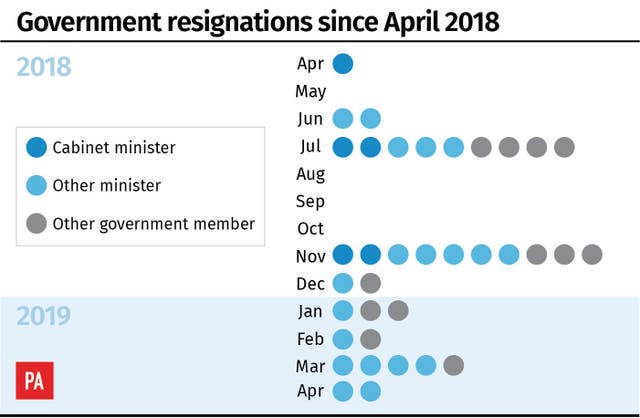
Leading Brexiteer Jacob Rees-Mogg described the offer to Mr Corbyn as “deeply unsatisfactory” and accused Mrs May of planning to collaborate with “a known Marxist”.
And normally-loyal Caroline Johnson joined a clutch of Tory backbenchers at Prime Minister’s Questions in the House of Commons who spoke out against what she called “the risk of letting down the country and ushering in a Marxist, anti-Semite led government”.
Mrs May was meeting the Labour leader in her Commons office in the hope of agreeing a position which can win a majority within the next few days, allowing her to request a short delay to Brexit at next week’s summit.
European Commission president Jean-Claude Juncker said the EU would accept an extension to May 22 if the UK had approved Mrs May’s Withdrawal Agreement by a “viable majority” before April 12.
But speaking in Brussels, he said a no-deal Brexit at the end of next week was becoming “more and more likely”, adding: “April 12 is the final date for possible approval. If the House of Commons does not adopt a stance before that date no short-term extension will be possible.”
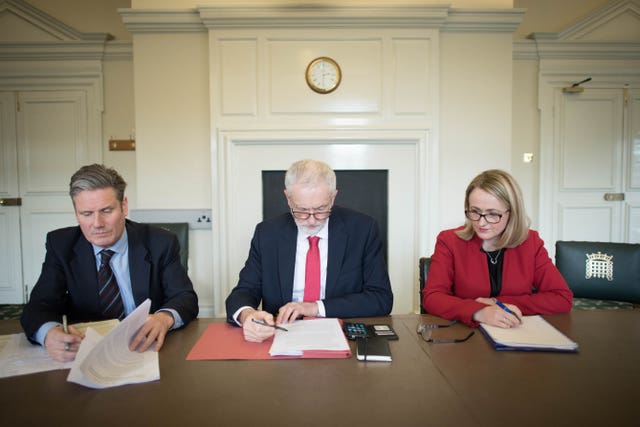
Mrs May told MPs that the purpose of her meeting with Mr Corbyn was “to look at those areas we agree on”.
“I think we both want to deliver leaving the EU with a deal,” she said. “I think we both want to protect jobs. I think we both want to ensure that we end free movement. I think we both recognise the importance of the Withdrawal Agreement.
“What we want to do now is find a way forward that can command the support of this House and deliver on Brexit, deliver on the result of the referendum and ensure that people can continue to have trust in their politicians doing what they ask us to do.”
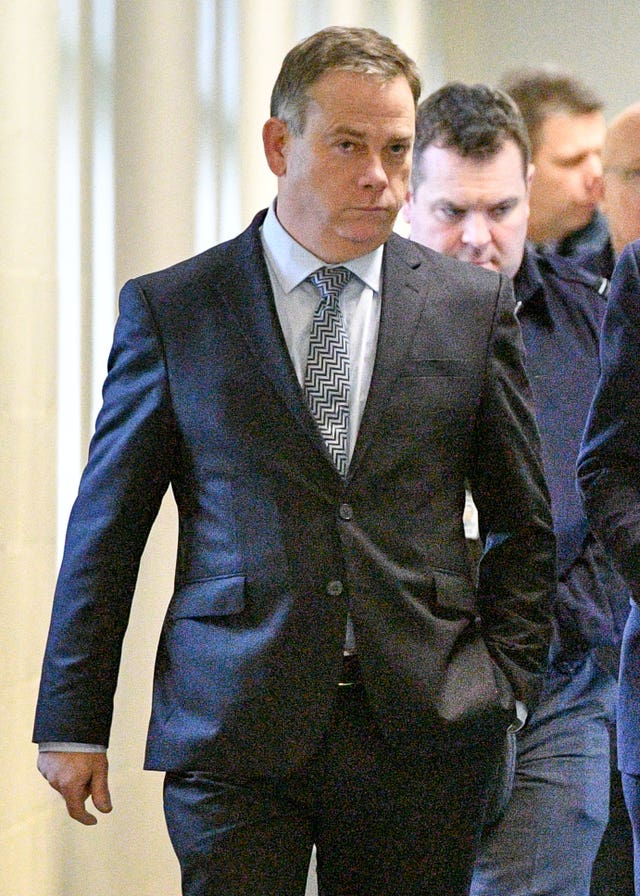
Mr Corbyn said he welcomed Mrs May’s “willingness to compromise to resolve the Brexit deadlock”, but otherwise avoided the issue during their weekly PMQs clash.
Mrs May was also meeting Scottish and Welsh first ministers Nicola Sturgeon and Mark Drakeford.
In his letter of resignation to the PM, Mr Adams said the Government faced two “great challenges” of delivering “the Brexit the people voted for” and preventing a Corbyn premiership.
He added: “Sadly, I fear that we are now at risk of simultaneously failing in both.”
The Selby and Ainsty MP – a close ally of Boris Johnson who took part in planning for his abortive push for the leadership in 2016 – said: “Legitimising and turning to Jeremy Corbyn to assist you at this crucial stage, rather than being bold, is a grave error.”
Mr Adams, who was made a whip in January 2018 and promoted to the Wales Office in November, said he continued to believe no-deal was better than a bad deal.
“It now seems that you and your Cabinet have decided that a deal cooked up with a Marxist who has never once in his political life put British interests first is better than no deal, ” he told the PM. “I profoundly disagree with this approach.”
Mr Adams’s resignation was the first since Tuesday’s Cabinet meeting and came shortly after Brexit Secretary Stephen Barclay said a softer Brexit was “the remorseless logic of the numbers of the House of Commons”.
Mr Barclay told BBC Radio 4’s Today programme: “If the Prime Minister’s deal won’t go through and no deal in law is taken off the table, then the consequence of that is either a soft Brexit or no Brexit at all.”
He blamed hardliners in Tory ranks for the situation, saying: “It’s regrettable that what we have been saying for several months now is coming to pass, but that is the remorseless logic of not backing the Prime Minister’s deal.”
Mr Barclay later told the House of Commons Exiting the EU Committee that there had been no agreement at Tuesday’s seven-hour Cabinet meeting for any extension beyond May 22.
Legislating for and holding a second referendum would take at least a year and was not the Government’s policy, he said.
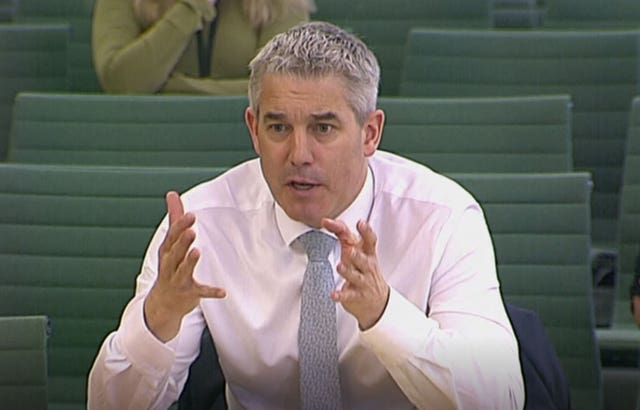
He told the cross-party committee that it remained possible that European Parliament elections could take place in the UK on May 23, though he stressed this was not the Government’s intention.
At Prime Minister’s Questions, a succession of Tory backbenchers got up to challenge the decision to hold talks with Mr Corbyn.
North-East Derbyshire MP Lee Rowley pointed out that the PM had last week called the Labour leader “the biggest threat to our standing in the world, to our defence, and to our economy” and asked: “In her judgment what now qualifies him for involvement in Brexit?”
And former Brexit minister David Jones asked: “Does it remain the position of the Prime Minister that the leader of the opposition is not fit to govern?”
A spokesman for the Labour leader later brushed off the attacks, telling reporters: “We are clear that there needs to be a majority found in Parliament to break the Brexit deadlock.
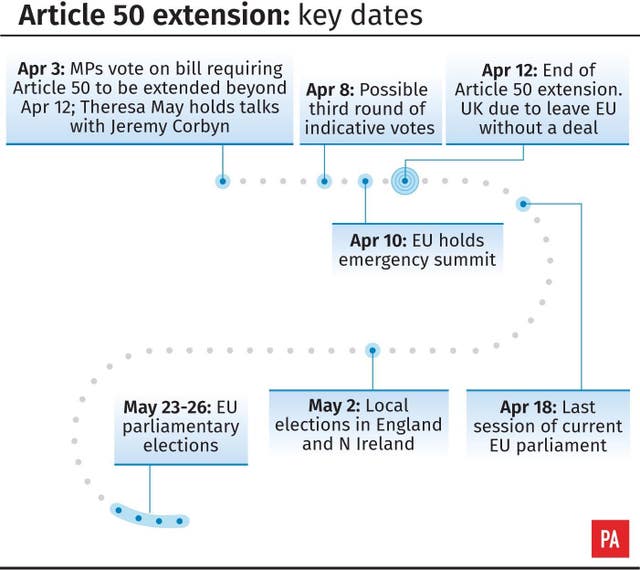
“A few insults here or there is not going to dim Jeremy’s commitment to do what is right.”
International Trade Secretary Liam Fox will address a potentially explosive meeting of the Tory backbench 1922 Committee on Wednesday evening.





